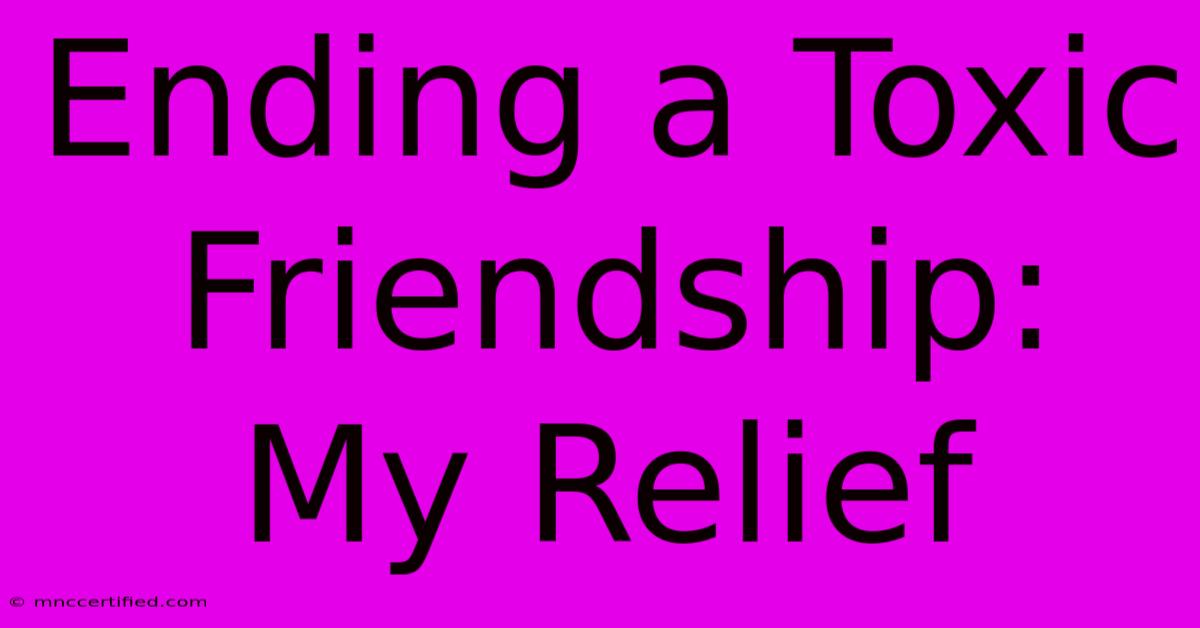Ending A Toxic Friendship: My Relief

Table of Contents
Ending a Toxic Friendship: My Relief and How You Can Find Yours
Saying goodbye to a toxic friendship is rarely easy, but the relief that follows can be incredibly liberating. This post explores the signs of a toxic friendship, the process of ending it, and the crucial steps to healing and moving forward. Learning to prioritize your well-being is key, and this journey towards self-care is worth every step.
Recognizing the Signs of a Toxic Friendship
Before you can end a toxic friendship, you need to recognize it. These relationships often subtly erode your self-esteem and mental health. Are you constantly feeling:
- Drained? Do you feel emotionally exhausted after spending time with this person? This is a major red flag.
- Guilty? Do you constantly apologize for things that aren't your fault? Toxic friends often manipulate your feelings to control you.
- Controlled? Do they dictate your choices, friendships, or activities? This is a sign of unhealthy boundaries being crossed.
- Small and insignificant? Do they constantly criticize you, belittle your achievements, or make you feel inadequate?
- Anxious or stressed? Do you dread interactions with this friend? This persistent unease is a clear indication of a problematic relationship.
- Used or manipulated? Are you constantly doing favors for them, but receiving little or nothing in return?
Important Note: It's crucial to distinguish between a temporary disagreement and consistent, damaging behavior. Occasional conflicts are normal in any relationship; however, a pattern of negativity and manipulation is a defining characteristic of a toxic friendship.
The Process of Ending a Toxic Friendship
Ending a toxic friendship can be emotionally challenging, but it's essential for your well-being. Here's a structured approach:
1. Self-Reflection and Preparation:
Before confronting your friend, take time for self-reflection. Journaling can be incredibly helpful. Identify specific instances of toxic behavior and how they've impacted you. This clarity will empower you during the conversation.
2. Setting Boundaries (Before the Break):
Before the final conversation, start setting boundaries. Limit your contact, decline invitations, and politely excuse yourself from conversations that become negative or controlling. This prepares you and them for the eventual distance.
3. The Difficult Conversation:
This conversation doesn't have to be dramatic. Be direct but respectful. Focus on your feelings and needs without blaming your friend. For example: "I've realized that this friendship isn't healthy for me anymore. I need to create some distance to prioritize my well-being." Avoid lengthy explanations or justifications; stick to the essentials.
4. Maintaining Distance:
After ending the friendship, maintain your distance. Unfollow them on social media, and limit any contact. This is crucial for your healing process. Resist the urge to engage in further conversations or arguments.
Healing and Moving Forward
Ending a toxic friendship is a significant step towards self-care. Allow yourself time to grieve the loss of the friendship, even if it was unhealthy. Engage in self-care activities:
- Connect with supportive friends and family. Lean on your healthy relationships for emotional support.
- Focus on self-improvement. Pursue hobbies, learn new skills, and engage in activities that bring you joy.
- Seek professional help if needed. A therapist can provide guidance and support during this transition.
This journey of self-discovery and healing will lead to stronger, healthier relationships in the future. Remember, prioritizing your well-being is not selfish; it’s essential. Your mental and emotional health deserves the utmost care and attention. The relief you feel after ending a toxic friendship is a testament to your strength and self-awareness. Embrace this newfound freedom and build a life filled with positivity and supportive connections. You deserve it.
Keywords: toxic friendship, ending friendship, unhealthy relationship, relationship advice, self-care, mental health, emotional well-being, healing, self-esteem, boundaries, letting go, moving on, how to end a friendship, signs of toxic friendship, break up with a friend
(Note: This article utilizes keywords naturally throughout the text, focusing on semantic relevance and readability. Off-page SEO would involve promoting this article through social media, guest posting on relevant blogs, and building backlinks from reputable websites.)

Thank you for visiting our website wich cover about Ending A Toxic Friendship: My Relief. We hope the information provided has been useful to you. Feel free to contact us if you have any questions or need further assistance. See you next time and dont miss to bookmark.
Featured Posts
-
Darts Star Littler Stops Playing Live
Dec 29, 2024
-
Warriors Vs Suns Game Preview 12 28 24
Dec 29, 2024
-
Free Stream Colorado Buffaloes Vs Byu Game
Dec 29, 2024
-
Klopps Advice For Trent Alexander Arnold
Dec 29, 2024
-
Colorado Vs Byu Today Channel And Time
Dec 29, 2024